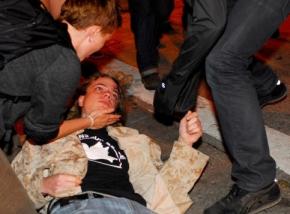We are all Scott Olsen
After the Oakland police attack on Occupy protesters, U.S. rhetoric about a commitment to "democracy" and "free speech" stands exposed, says Iraq war veteran .
AS A participant in the Occupy movement for the past month, it came as a shock to read about the story of Scott Olsen, the 24-year-old Marine veteran who was hit in the head by a police projectile in Oakland.
While watching the video of the police attack, I was disgusted by the callousness used to suppress someone who clearly has earned the right to speak about the injustices in society. This assault, coming after the attack on members of Veterans For Peace by police in Boston, has shown the country what length our rulers will go to in order to crush their opponents.
And for veterans like Scott Olsen and me, October 25 conjured personal memories of how the U.S. handles dissent when it deploys troops to fight wars in the Middle East and beyond.
As a veteran of the 10th Mountain Division, I feel that our occupations--not the U.S. government-run occupations in the Middle East, but the grassroots ones right here, in city after city across the U.S.--are doing more to change the landscape of America and the world than anything that I participated in while overseas.

I believe in fighting for this movement because protest is the best way to ensure that there are no more endless wars or economic instability in our lives. And I am hardly alone in believing this. Scott Olsen also believed it--along with countless other veterans who are part of the Occupy movement all over the country.
This participation by soldiers and veterans is sorely needed because veterans' services and retirement benefits are on the chopping block--like so many other services in this country. Despite the talking points that recruiters use when promoting the supposed job skills that troops gain while serving, those of us who fought in Iraq and/or Afghanistan find it harder to gain employment than our civilian counterparts. In fact, veterans who have left military service during the past decade have an 11.9 percent unemployment rate, higher than the national average, according to the Bureau of Labor Statistics.
In fact, what I witnessed during my military service drove me to join the Occupy movement, and the economic wreck that has unfolded since has made this struggle even more urgent. Having to fight the VA for basic services and disability compensation can make any veteran feel isolated, especially when the age-old mantra of "pulling yourself up by your bootstraps" is regurgitated time and time again.
The reality is that the Occupy movement has ushered in a new era and has begun to transform our conceptions about what is possible, not just for veterans, but for everyone struggling under the weight of the Great Recession that began in 2008.
We are not alone, and the confidence that I feel from that realization has kept me in the streets every day. I would be willing to bet that Scott Olsen felt the same way when he joined the Occupy movement.
I WILL never forget the atrocities committed in Oakland on the night of October 25. Aware of the police action there and worried that the Atlanta police might duplicate the effort, I, along with many other people, faced down Atlanta's police as our own encampment was evicted.
I watched as young people built barricades in the streets around Troy Davis Park to protect the crowd from a police riot. We were eventually evicted that night, and the barricades of tents and tables were taken down. It wasn't until I returned home that I heard what had happened to Scott Olsen.
The news rang in my ears and stiffened my resolve to continue on, despite the temporary defeat we suffered that night. It really is true that the whole world was watching Oakland that night, and continuing this fight is the best way to honor Scott Olsen as he recovers.
I am Scott Olsen, along with so many other veterans who have defiantly taken on the crimes of the 1 percent. The 1 percent is the part of the same elite that sent us to war in order to secure access to oil and other riches, while we, along with the peoples and countries that we occupied, paid the highest price.
I am Scott Olsen because I am sick and tired of a system that produces war and violence, a system that sends 19-year-olds like myself to fight and possibly die for a war that isn't even in our interests.
I am Scott Olsen because as the socialist Eugene Debs once said:
The working class who fight all the battles, the working class who make the supreme sacrifices, the working class who freely shed their blood and furnish the corpses, have never yet had a voice in either declaring war or making peace. It is the ruling class that invariably does both. They alone declare war, and they alone make peace.
We are all Scott Olsen, and our class is awakening to a new age in which we are finding our voice, despite what seems like overwhelming odds. Veterans have begun to address the issues of the occupations alongside our civilian brothers and sisters, and Scott Olsen's wounds demonstrate that the state doesn't care about veterans anymore than it does the rest of the 99 percent.
Now is the time to demand that no other soldier experiences what Scott Olsen and I experienced overseas. The people of the Middle East--by carrying out uprisings and revolutions against U.S.-backed dictators as well as marches and other actions in solidarity with the Occupy movement in the U.S.--are showing that official U.S. pronouncements about "spreading democracy" are nothing but doublespeak.
We are all Scott Olsen, and we are sick and tired of being the victims of the 1 percent--here and abroad.


